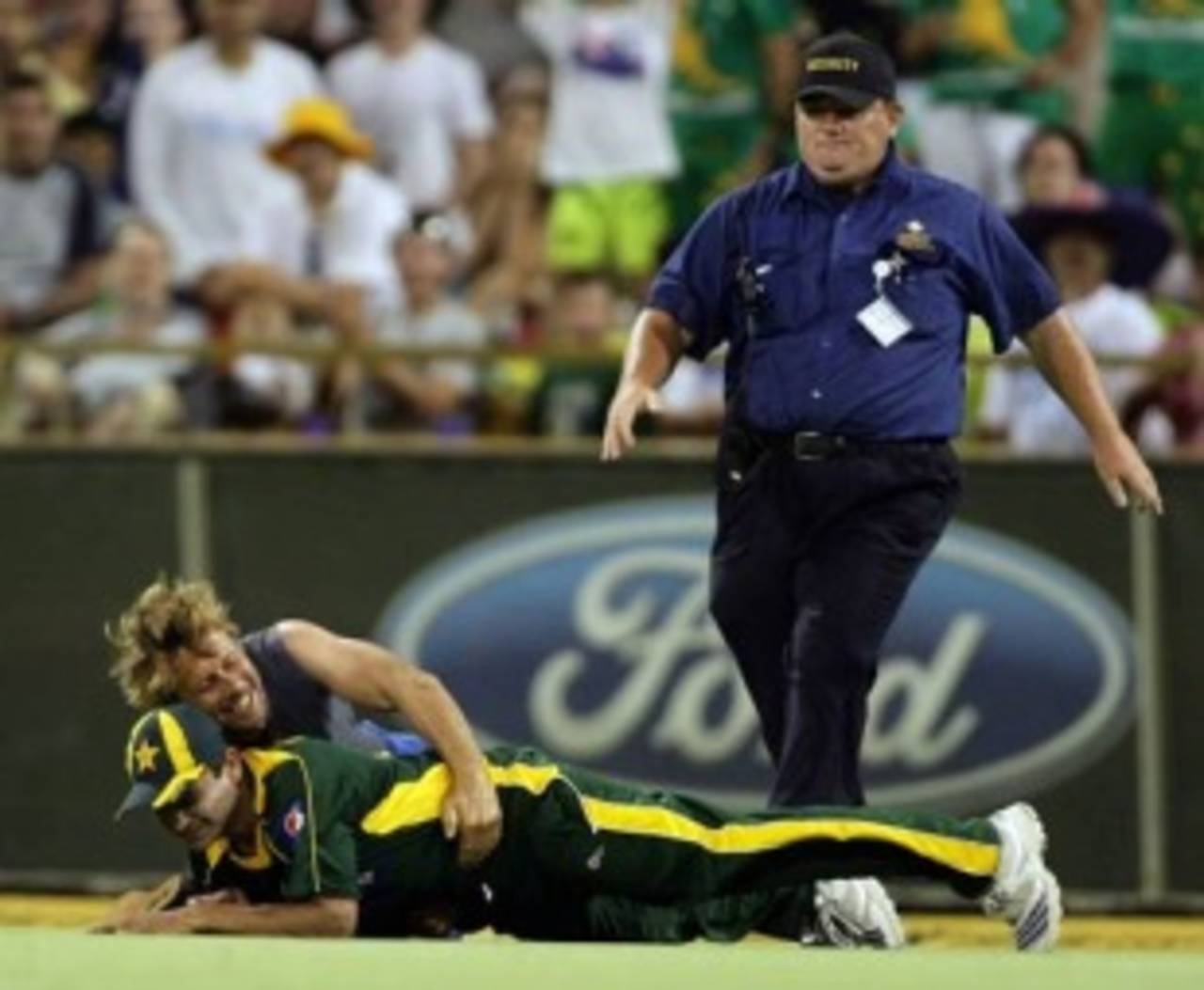CA calls for $20,000 fines for pitch invaders
CA defended its security procedures and believed bigger fines would be a better deterrent than fencing off the crowd and banning alcohol
Brydon Coverdale
02-Feb-2010

The man who tackled Khalid Latif was the second pitch invader at the WACA • Getty Images
Cricket Australia has called for fines of up to $20,000 for pitch invaders after being issued a please-explain from the ICC over the Perth incident in which Khalid Latif was tackled to the ground. CA defended its security procedures and believed bigger fines would be a better deterrent than fencing off the crowd and banning alcohol, as was suggested by the Pakistan sports minister.
Although CA insists the incidence of pitch invasions has fallen since the maximum fines were increased in the eastern states several years ago, the problem remains at some venues. The man who ran on to the WACA and grabbed Latif was the second ground invader during Sunday's match.
During the second Test against West Indies in December, a man ran on to the Adelaide Oval and the security staff were so slow to react that he reached the middle and was casually chatting to Chris Gayle when he was finally caught. Gayle's team is back in Australia for a one-day series and he said this week that "they could clamp down on those things more and look after the players a bit more".
"We don't want to have to have a virtual ring of steel around the game, separating the game and the players from the public," Cricket Australia's spokesman Peter Young told Cricinfo. "We want the public to feel engaged with the game and to be looking out across the fence at an exciting cricket match, not looking out across the fence at mesh wire and shoulder-to-shoulder security personnel.
"We already have quite a comprehensive alcohol programme. There are a small minority of people who let alcohol control them rather than vice-versa. In relation to them we have stringent responsible service of alcohol (RSA) programmes and processes. At the Hobart Test, a couple of staff were fined very heavily because they were found to be in breach of the state RSA requirements."
Cricket Australia was on Tuesday preparing its report on the WACA incident for the ICC, highlighting that it will lobby the Western Australian state government to increase the penalty for ground invaders. The man who tackled Latif has been charged with assault but for the separate offence of trespassing onto the WACA, the most he can be fined is $500 due to the state laws.
In the eastern states those fines are higher - up to $7000 in Melbourne - but incidents still occur. A streaker who was shoulder-charged by Andrew Symonds at the Gabba in 2008 was not hit with the maximum penalty by the courts, a result that disappointed Cricket Australia, and Young said greater fines were a significant disincentive.
"Since the fines went up, the problem has literally stopped in its tracks," he said. "We do have isolated cases on the east coast but they are isolated. It's usually some idiot who doesn't realise he's going to spend the next six months paying off a $7000 fine.
"In our view a $20,000 fine would probably be even better. These are multi-million dollar events that have global exposure and people running on to the field ... reinforces the stereotype in the minds of some international observers that Australia is nothing more than a nation of drunken oiks and that's very damaging."
Ground invasions are handled differently around the world and methods vary from the authoritarian to the overly lax. In India and Pakistan, barriers are built to stop fans entering the field of play, whereas during Australia's World Cup semi-final in St Lucia in 2007, drunken spectators who ran on the field were simply placed back in the crowd and allowed to keep watching the game.
In Australia some grounds, including the MCG, are protected by police but at other venues the job is left to private security firms. Adelaide and Perth are monitored by security companies but even where the police are present ground invasions do occur, as in this summer's Boxing Day Test when a fan ran almost the length of the MCG before being apprehended.
"By and large, trained state police officers, particularly if they're from the special offence squad, as they are in Melbourne, are really good," Young said. "They're highly trained, they're fit, they're appropriately equipped, and they're well-rehearsed. They do a really, really good job. In Perth, the state police have got a particular policy so they're not on the ground. The security sub-contractor has its own personnel who does that work.
"We don't want to ring the ground with a ring of security steel. The far more effective approach is to discourage them from thinking about doing it in the first place."
Brydon Coverdale is a staff writer at Cricinfo